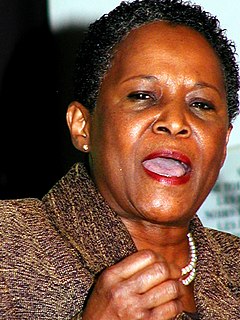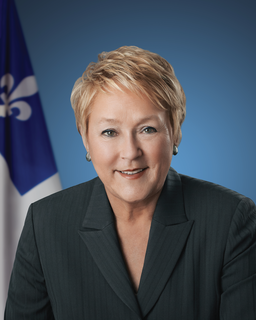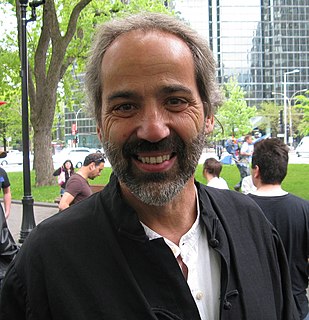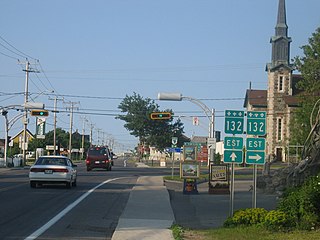
The Parti Québécois is a sovereignist and social democratic provincial political party in Quebec, Canada. The PQ advocates national sovereignty for Quebec involving independence of the province of Quebec from Canada and establishing a sovereign state. The PQ has also promoted the possibility of maintaining a loose political and economic sovereignty-association between Quebec and Canada. The party traditionally has support from the labour movement, but unlike most other social democratic parties, its ties with organized labour are informal. Members and supporters of the PQ are called "péquistes", a French word derived from the pronunciation of the party's initials.
André Bellavance is a Canadian politician, who served in the House of Commons of Canada from 2004 to 2015 and is currently the mayor of Victoriaville, Quebec.

The Parti Québécois leadership election of 2005 was held from November 13 to November 15, 2005 to elect the new leader of the Parti Québécois, the main sovereigntist and social democratic political party in Quebec, Canada.
Pierre A. Paquette is a Canadian economist, professor, union leader and politician.

Vivian Barbot is a Canadian teacher, activist, and politician. She is a former President of the Fédération des femmes du Québec, a former Member of Parliament and former vice-president of the Bloc Québécois. She was the party's interim leader and president following the resignation of Gilles Duceppe in May 2011. Barbot became the first person of a visible minority group to lead a Canadian federal political party with parliamentary representation.

Maria Mourani was an independent Member of Parliament in the federal riding of Ahuntsic in Canada. She was formerly a member of the Bloc Québécois before leaving the party over its support for the proposed Quebec Charter of Values. She joined the New Democratic Party in November 2014 but was not a member of the party's caucus due to the party's policy against crossing the floor; she stood for the NDP in the 2015 Canadian federal election, but did not win. Mourani was the first woman of Lebanese origin elected to the Canadian House of Commons. In 2017, she became the Quebec representative in the Permanent Delegation of Canada at UNESCO.

The Parti Québécois leadership election of 2007 elected the seventh leader of the Parti Québécois, the main political party to promote Quebec independence in Quebec, Canada, and was won by Pauline Marois.

Daniel Paillé is a Canadian politician, who represented the riding of Prévost in the National Assembly of Quebec from 1994 to 1996 as a member of the Parti Québécois, and represented the district of Hochelaga in the House of Commons of Canada as a member of the Bloc Québécois. He was elected leader of the Bloc Québécois with 62 percent of the vote on December 11, 2011. Paillé stepped down as leader on December 16, 2013 due to health reasons.
Jean-François Fortin is a Canadian politician. He was elected to represent the riding of Haute-Gaspésie—La Mitis—Matane—Matapédia in the 2011 federal election as a member of the Bloc Québécois, and was chosen interim parliamentary leader of the Bloc on February 26, 2014.
An election for the leadership of the Bloc Québécois was held June 14, 2014 to choose a successor for Daniel Paillé who resigned on December 16, 2013 due to health reasons.

The 2015 Parti Québécois leadership election was held from May 13 to May 15, 2015 as a result of the resignation of Parti Québécois leader Pauline Marois after the defeat of her government in the April 7, 2014 provincial election.

The 42nd Quebec general election was held on October 1, 2018, to elect members to the National Assembly of Quebec. The election saw a landslide victory for the Coalition Avenir Québec (CAQ) led by François Legault won 74 of 125 seats, giving the party a majority and unseating the Quebec Liberal Party. The Liberals became the Official Opposition with 31 seats.

Mario Beaulieu is a Québécois nationalist, who was the interim leader (2018-2019) 2018 and former president (2014–2018) of the Bloc Québécois. He previously served as BQ leader from 2014 to 2015. He was the president of the sovereigntist Société Saint-Jean-Baptiste of Montreal from 2009 to 2014, and has been the spokesman for the Mouvement Québec français, a coalition of organizations in favour of the preservation and defence of the French language in Quebec.
The 2016 Parti Québécois leadership election occurred from October 5 to October 7, 2016 due to the resignation of Parti Québécois leader Pierre Karl Péladeau on May 2, 2016. Jean-François Lisée was elected on the second ballot with 50.63% of the vote.

Rhéal Éloi Fortin is a Canadian lawyer and politician.

An election for the leadership of the Bloc Québécois was held on March 14, 2017 to choose a successor to Gilles Duceppe, who resigned on October 22, 2015 after the 2015 Canadian federal election. Rhéal Fortin, MP for Rivière-du-Nord, has been serving as interim leader since Duceppe's resignation. The election was initially scheduled for April 22, 2017 but ended on March 14, 2017 at the end of the nomination period, because there was only one candidate. Ouellet's tenure was controversial due to her staunch separatist views, and, following a leadership vote, she was forced to resign in June 2018.
The 2019 Bloc Québécois leadership election was initiated by the resignation of party leader Martine Ouellet in June 2018. While originally scheduled to be held on February 24, 2019 on a One Member One Vote basis, Yves-François Blanchet, as the only candidate in the race following the nomination deadline of January 15, 2019, was officially acclaimed leader on January 17, 2019.






















